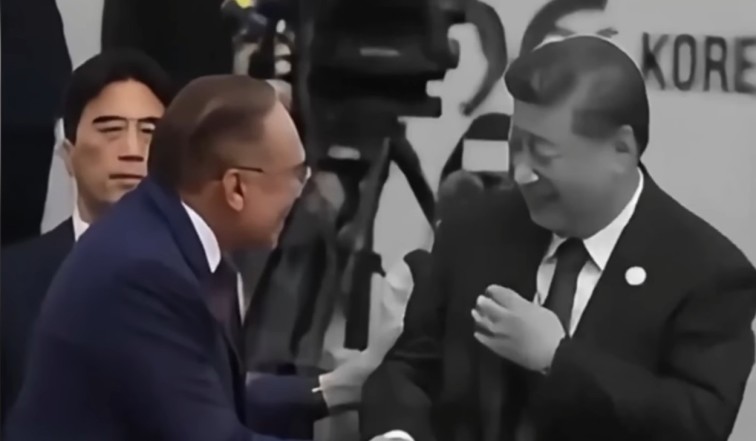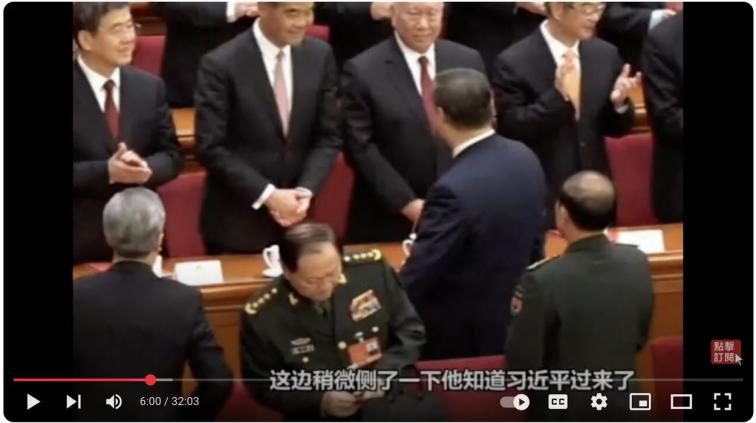Xi Jinping visits the Mao Zedong Memorial Hall to pay his respects.(online image)
[People News] On October 30, the Trump–Xi summit agreement was released by the U.S. side. The Taiwan issue, notably, was not discussed—drawing global attention. Why did Xi Jinping stop talking about Taiwan? Commentators analyze that after securing his third term, Xi lacks confidence in his own “imperial” authority and hoped to find a way to assert dominance. However, the disappearance of nine generals before the Fourth Plenary Session may suggest that Xi has lost control of the military, making any attack on Taiwan a distant dream. In fact, the Chinese Communist Party (CCP) has not always sought to “reunify” Taiwan—early on, CCP founder Mao Zedong even supported Taiwan’s independence.
I. Mao Zedong’s Historical Support for Taiwan Independence
According to research by Li Xiaofeng, a professor at the Graduate Institute of Taiwanese Culture at National Taipei University of Education: In 1928, at the suggestion of the CCP, Taiwanese leftists such as Hsieh Hsueh-hung and Lin Mu-shun formed the Taiwan Communist Party. The party was established on April 15, 1928, in the French Concession in Shanghai. Articles 2 and 3 of its political platform explicitly stated: “Long live the independence of the Taiwanese people” and “Establish the Republic of Taiwan.” At that time, the CCP not only did not oppose it but also sent representative Peng Rong to attend the founding conference.
In Red Star Over China, American journalist Edgar Snow recorded that during his visit to Yan’an on July 16, 1936, he asked Mao Zedong: “Do the Chinese people intend to recover all lost territories from Japanese imperialists?” Mao replied: “We must defend the sovereignty south of the Great Wall and recover all our lost territories. This means Manchuria must be recovered. But we do not include Korea, which used to be a Chinese colony. When we recover China’s lost territories and achieve independence, if the Korean people wish to free themselves from Japanese imperialism, we will wholeheartedly support their fight for independence. The same applies to Taiwan.”
In June 1941, Zhou Enlai wrote in his article National Supremacy and State Supremacy that China should not only pursue its own independence but also support other national independence and liberation movements—including the anti-Japanese movements in Korea and Taiwan.
On May 1, 1945, shortly before the end of World War II, Jiefang Daily reported that during the CCP’s Seventh National Congress (held from April 23 to June 12, 1945), it published a congratulatory message from “Party members from Taiwan and other countries residing in Yan’an.” The senders included representatives from Taiwan, the Philippines, Vietnam, Thailand, Malaya, the Dutch East Indies, and Burma. The message explicitly stated that the CCP had long supported the independence movements of “Eastern peoples,” including Taiwan.
After the war, the Nationalist government retook Taiwan. In 1947, when the “February 28 Incident” broke out in Taiwan, Jiefang Daily published an article on March 8 supporting Taiwan’s independence. In a radio speech from Yan’an, Mao Zedong declared:
“The armed forces led by our Chinese Communist Party fully support the Taiwanese people’s struggle against Chiang Kai-shek and the Kuomintang. We support Taiwan’s independence and support the Taiwanese people in establishing the kind of state they themselves desire.”
II. Whether Mao Would Attack Taiwan Was Tied to U.S.–China Relations
Mao first raised the slogan of “liberating Taiwan” on October 1, 1949. However, this “liberation” of Taiwan had a very different meaning from today’s CCP notion of “occupation.” Mao’s initial goal was likely to eliminate the Kuomintang government, gain legitimacy, and help Taiwan achieve independence.
In 1950, when Mao entered the Korean War, he temporarily abandoned plans for a military assault on Taiwan. After U.S. setbacks in Korea, Washington decided to back Chiang Kai-shek’s Nationalist regime, and Mao again put the “liberation of Taiwan” on hold. In 1954, the People’s Liberation Army shelled Kinmen and occupied the Dachen Islands to test the U.S.–Taiwan defense line. In 1958, Mao ordered renewed bombardment of Kinmen, creating a long-term “fight but don’t land” deterrence pattern. By 1971, with the normalization of U.S.–China relations, Mao Zedong completely gave up Taiwan.
A review of history shows that whether the CCP moved to attack Taiwan was closely linked to the state of Sino-American relations. The 1950 Korean War worsened ties, and Mao prepared to attack Taiwan; by 1971, when relations thawed, Mao abandoned the idea. On October 30, 2025, during the Trump–Xi summit in Gyeongju, South Korea, Xi Jinping again sought to ease tensions with the U.S. By historical logic, this means Xi has, for now, abandoned any plan for armed unification.
III. The CCP’s Rule Is Illegitimate Because a Government-in-Exile Still Exists
Xi Jinping’s desire to forcibly unify Taiwan is tied to the CCP’s lack of legitimacy. There are three main sources of political legitimacy:
-
Popular consent — gained through free and fair elections, such as Taiwan’s democratically elected government today.
-
Effective control — obtained through revolutionary or military means, such as the CCP’s rule over mainland China.
-
Legal succession — inheriting sovereignty and legitimacy from a prior lawful government or historical state.
On February 12, 1912, the Qing government and the newly established Republic of China signed the Abdication Edict of the Qing Emperor and the Articles of Favorable Treatment of the Imperial Family, transferring sovereignty from the Qing to Sun Yat-sen’s Republic of China.
The reason people continue to question the CCP’s legitimacy is that the Republic of China, as a government-in-exile, still exists. In reality, two governments claim continuity over China. If the CCP were to attack Taiwan—a legitimate, existing government—it would be committing aggression and face global condemnation and sanctions.
Historically, it was the Kuomintang-led Republic of China that maintained the goal of unification. Without the CCP, both the mainland and Taiwan would still be under its rule. Since taking power, Xi Jinping has held ceremonies commemorating Sun Yat-sen and celebrated Taiwan’s Retrocession Day, seemingly attempting to complete the Kuomintang’s historical mission of unification.
In theory, the CCP should sign an agreement with Taiwan’s Kuomintang acknowledging that it lawfully inherits the pre-1949 Republic of China’s rule over the mainland—thus establishing legal legitimacy. However, with today’s political realities, even renewed “KMT–CCP cooperation” seems impossible.
(First published by The People News) △










News magazine bootstrap themes!
I like this themes, fast loading and look profesional
Thank you Carlos!
You're welcome!
Please support me with give positive rating!
Yes Sure!